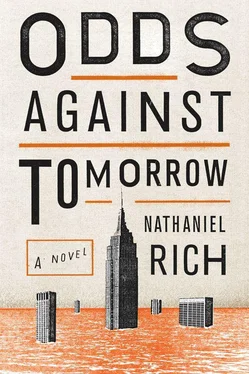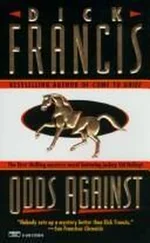He wondered what Jane was doing.
He lugged a water jug outside and began again. It was October now, and the temperature was starting to drop into the sixties, maybe even the high fifties, but soon the sweat was so heavy that he took off his T-shirt and then his pants. Orange dirt descended in rivulets down his chest. Blisters appeared in the crooks of his fingers. By the time he’d finished smashing up the entire field the sun was nearly touching the horizon. He dropped the hoe and stumbled into the marsh.
You had to go slow, hesitatingly, careful not to get hooked by a loose nail or a stubborn branch. Sections of warped plywood and broken trees were tangled with the brush. It was like walking through dirty, matted hair. He stepped carefully around a toppled tree trunk that had landed upside down in the earth. Its crown was lodged in the ground, and its root system spread in the air like branches. He heard a song in his head:
Oh take me back to Elkhart Lake, where the cotton candy grows.
Where the little marshmallows hang from the trees.
And the lollipops grow on the ground!
After a hundred yards he found a muddy finger of land that pointed into a calm pool. Here the earth was smoother, covered only by a light blush of moss. This was where the ocean began. Beyond this pool the creek snaked around a bend before expanding into a wide channel that fed Jamaica Bay. He removed his sneakers and waded in, the mud slimy beneath his feet, until the water rose to his armpits. The creek was rust colored, silty, and very cold. Without thinking, without caring, he dunked his head. The water flooded his ears, tickled his face, cradled his brain. The coldness was shocking, but when he resurfaced, everything had sharpened. The whiteness of the sky, the marsh’s clicking insect choruses, the breeze against his face like a fresh shave.
On the way back to the bank building he congratulated himself for not worrying about the toxins that might have tainted his little bath — mercury, PCBs, dioxins, sewage. But perhaps they’d had an effect. A prickly wooziness settled over him, and as soon as he reached the upstairs couch he was dizzy. When he lay down the cushion under his head became a brick and knocked him into unconsciousness.
* * *
He was tamping down the soil one afternoon, speculating about the alimentary properties of the marsh breeze — would it nourish the spinach or desiccate it? — when he began to hear the voices.
He had started by planting spinach because it was the only vegetable he recognized among the small pouches of vegetable seeds he’d found at Jackpot. His haul had included snow peas, kohlrabi, bitter gourd, soybean, burdock, and ten-pound bags containing soil the color of crushed brownies.
How the mighty had fallen. Mitchell Zukor, the internationally renowned prophet, with $1,996.50 sitting in a backpack twenty yards away — he had given the balance, $50,000, to Jane for use as start-up capital — was now on his hands and knees, scrounging in the orange dirt, choking on it, getting it into his eyes and underwear.
But whatever had started to happen to him in the cold waters of the marsh continued to happen. The long stretches of quiet labor narcotized him. Time was again becoming strange. It moved in erratic ways: in large bounds, when he worked in the fields. During other activities, as when he bathed in the marsh, it halted altogether. Light determined everything: his sleep schedule, his mealtimes, his bodily functions. The mineral smell of freshly turned earth also contributed, as did the sharp, wet breeze of the swamp, like the whip of a wet towel, that passed freely through the exploded windows of the third floor where he slept. The general sensation was of mindlessness. He didn’t know what he was going to do next, though that didn’t bother him. All that mattered was that he was now doing something.
But then he heard the voices. And they were calling his name.
So this is how it would happen. Hadn’t he, to a certain extent, been waiting for it? First the inexplicable impulse to follow Hank Cho on his kamikaze mission, then the rolling about nearly naked in the dirt, and finally the voices calling out to him, singing hymns, telling him to drown himself in the ocean.
“Mitchell Zukor?”
The voices weren’t quite inside his head, but they weren’t far away either. They were coming from the direction of the marsh.
“Mr. Zukor?”
He turned, expecting to see nothing, or worse — a seven-foot-tall cockroach, for instance, wearing a monocle — but instead there were two people, a man and a woman, roughly his own age. They stood directly beside each other on an archipelago of sidewalk that was all that remained of Flatlands Avenue. Each wore a bulky backpack; the girl had a blue bandanna wrapped around her head. They looked like hikers who had taken a wrong turn off the Appalachian Trail. A disastrously wrong turn.
“Jane told us we’d find you here,” said the boy. “Jane Eppler.”
“Who are you?”
“Ronald. This here’s Cassie.”
“Hey,” said Cassie. She took one step forward, stepping to the edge of the garden plot.
Mitchell leaped up. “Listen,” he said, glancing nervously at Cassie’s feet, “I just spent two full days tilling this land.”
Ronald reached for Cassie’s hand and pulled her back. “Oh,” said Cassie. “Of course. It looks good.”
These social niceties, their tentative, smiling approach — there was something vestigial about it all. It was pathetically antediluvian. He had no time for it. State your purpose, then be on your way. And leave me alone.
“Jane asked us to check on you,” said Ronald. “Make sure you’re OK.” He was looking at Mitchell very closely.
“It’s only been, what, five days? What could’ve happened to me in that time?”
The two of them glanced at each other.
“It’s been almost two weeks. At least since Jane came back to the island.”
“Hm. I don’t know about that.”
“We just wanted to make sure everything was … OK.”
“I’m fine,” said Mitchell. “You can go back to Randall’s Island and tell Jane I’m fine .”
“We’re not going back,” said Ronald.
“And she’s not on Randall’s Island anymore,” said Cassie. Her mouth opened wide when she spoke, disclosing a winking pearl within. A tongue stud: another quaint, even nostalgic touch, a relic from the early part of the century, like fax machines or vitamin supplements. “Jane is in Manhattan. They opened it up. On Wednesday.”
“Wednesday,” said Mitchell. He chewed on it like a recalcitrant wad of taffy. “ Wed- nes-day.”
“Three days ago.”
Three days. Knowing Jane, she’d probably already rented an office, hired a staff, designed a website, issued press releases, negotiated contracts with all of FutureWorld’s old clients. Joined Tewilliger’s suit against Alec Charnoble. Ate a steak at the Palm, side of creamed spinach, side of half-and-half.
“You said you were staying here?”
“We want to do what you’re doing,” said Ronald.
“You walked away from ‘Mitchell Zukor,’” said Cassie. “You walked away from everything, all the old systems. We want that too. A lot of people want that.”
“No,” said Mitchell. This wouldn’t do. “I can’t help you.”
“We’re not asking to stay with you,” said Ronald. “We found a structure about a mile down. A school. And Jane told us about Jackpot.”
What was Jane after? Was she sincerely worried about what might happen to him, left to his own devices, all alone in this storm-ravaged wasteland? Or was this a subtle poke, an effort to get him to return to Manhattan and help launch Future Days?
“There’s really no reason for Jane to worry,” said Mitchell. “I’m self-sufficient.”
Читать дальше












